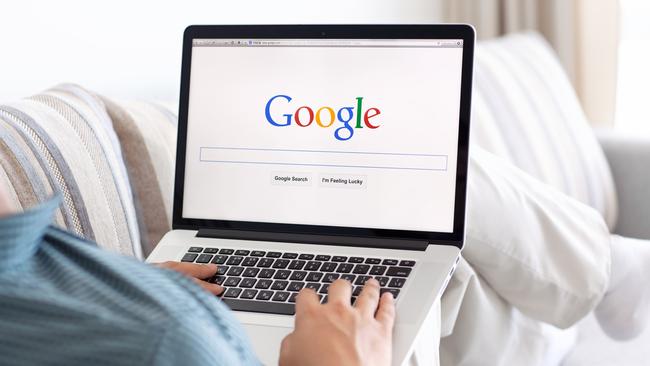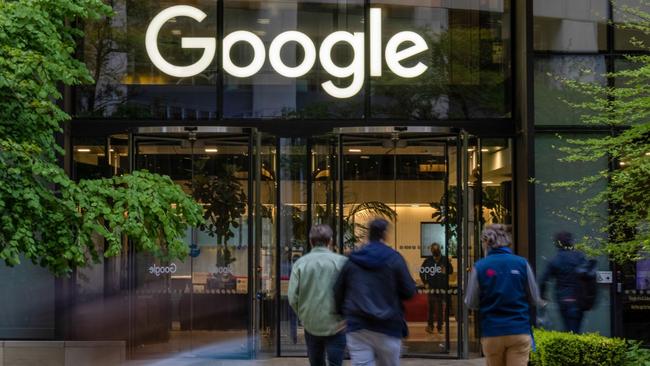Competition watchdog steps up attack on Google, saying AI is failing to dent its monopoly
AI is having a ‘limited’ effect on disrupting Australia’s internet search market, with Google maintaining its effective monopoly, the competition regulator says as it seeks to rein in the company.

Artificial intelligence is having a “limited” effect on disrupting Australia’s internet search market, with Google maintaining its effective monopoly, the competition regulator says as it steps up its efforts to rein in the $US2.11 trillion ($3.29 trillion) behemoth.
Google dominates Australia’s search engine market, with almost 94 per cent share, with its nearest rival – Microsoft-owned Bing – having 4.7 per cent, the Australian Competition & Consumer Commission found in its latest digital platform services inquiry report.
This is despite the company’s core business being reportedly “under siege” as people are increasingly getting answers from artificial intelligence and younger generations use other platforms to gather information. Meanwhile, the quality of the results on Google’s search engine is deteriorating as the web is flooded with AI-generated content.
But ACCC commissioner Peter Crone said AI tools were enabling technological innovations across a range of digital platforms but Google’s competitors, including Microsoft, were “yet to “gain meaningful market share”.
“While it is too early to say with certainty, with use of AI constantly developing, the impact of generative AI on market dynamics in general search appears limited so far,” Mr Crone said.
Mr Crone was speaking as the federal government formally backed the ACCC’s request for new powers to regulate digital platforms such as Apple, Google and Facebook, including service specific codes of conduct.
Google is facing the prospect of being split up in the US after an antitrust case found it guilty of running an illegal monopoly – although President-elect Donald Trump has said such a move would be “dangerous” as China seeks to overtake the US in global tech dominance.

The ACCC is working on a separate major case against Google that is expected to be filed early in the new year, while several class actions against the search engine giant are also being prepared in Australia.
“It is important for us to closely monitor overseas developments while we consider reforms in Australia,” Mr Crone said.
Under the new powers the ACCC could designate a company, requiring it to comply with a specific code of conduct laying down rules of conduct and enforceable dispute resolution.
The ACCC’s ninth digital platform services inquiry report said Google and Microsoft are well-placed to leverage generative AI into their search offerings given their significant presence across the generative AI supply chain, including through commercial partnerships.
But Mr Crone said the quality of AI-generated answers when used for internet search varied.
“The possible proliferation of AI-generated content is another lens to look at search quality. While some consumers may find the generative AI search experience more useful and efficient, others may be concerned about the accuracy and reliability of AI-generated responses to search queries,” Mr Crone said.
A Google spokesman said: ““We are constantly investing and innovating to improve the quality of Google Search so it remains helpful and provides high-quality, relevant information. This is vital to ensure consumers continue to trust and value Search.”
Google is the default search engine on the majority of browsers due to its commercial pre-installation and default arrangements with third parties and its ownership of the Chrome browser. But its grip is loosening.
The US Department of Justice said Google should end its default search arrangement with Apple – which began in 2003 -endangering as much as $US20bn a year in highly profitable revenue for the iPhone maker.
The US Justice Department also wants Google to sell Chrome.
In the EU, mandatory choice screens have been introduced, as well as measures aiming to address self-preferencing, under the Digital Markets Act. The UK is also in the process of introducing a new competition regime for digital platforms.
Meanwhile, In Canada, Google has been sued for its anti-competitive conduct in online advertising and wants the tech giant to sell two of its ad tech tools.
But in its home market, Google’s dominance is beginning to slip. In 2025, eMarketer projects, Google’s share of the US search-advertising market will fall below 50 per cent for the first time since the company began tracking it.
Google reported strong revenue growth last quarter, but the rate at which people clicked on ads that appear in search results was down 8 per cent compared with a year ago, according to data from advertising platform Skai. It’s not clear why this is happening, but one logical conclusion is it’s the result of Google’s own AI-based summaries, which eliminate the need to click on sponsored links or scroll down to where the ads are.
One study from January by search-engine-optimisation software company Authoritas found Google’s AI answers in its search results could up-end rankings and traffic to existing websites. Ad sales firm Raptive has projected that the full rollout of this change to search could erase $US2bn in revenue for publishers.
But although AI has the potential to finally unseat Google, it’s likely to take a long time before Google’s dominance truly fades, says David Yoffie, a professor at Harvard Business School.
“We know from behavioural economics that people tend to get into certain routines, and in the absence of a spectacularly better product, people tend to stick with that,” he said.
Additional reporting: Dow Jones




To join the conversation, please log in. Don't have an account? Register
Join the conversation, you are commenting as Logout